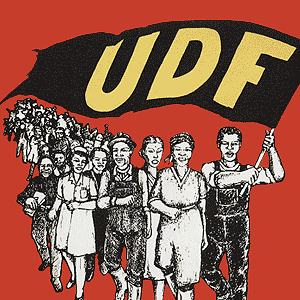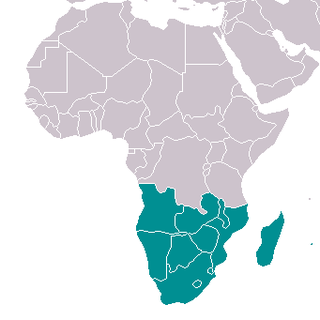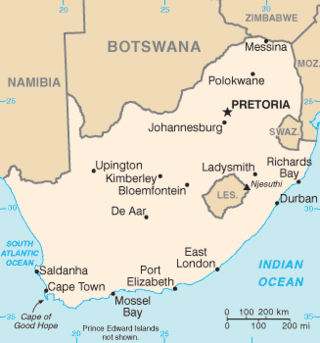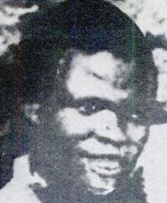
The United Democratic Front (UDF) was a South African popular front that existed from 1983 to 1991. The UDF comprised more than 400 public organizations including trade unions, students' unions, women's and parachurch organizations. The UDF's goal was to establish a "non-racial, united South Africa in which segregation is abolished and in which society is freed from institutional and systematic racism." Its slogan was "UDF Unites, Apartheid Divides." The Front was established in 1983 to oppose the introduction of the Tricameral Parliament by the white-dominated National Party government, and dissolved in 1991 during the early stages of the transition to democracy.

United Nations Security Council resolution 591, adopted unanimously on 28 November 1986, after recalling resolutions 418 (1977), 421 (1977), 473 (1980) and 558 (1984), the Council strengthened the mandatory arms embargo against apartheid South Africa imposed by Resolution 418, and made it more comprehensive. Resolution 591 sought to clarify vague terms from previous resolutions on the topic.

Internal resistance to apartheid in South Africa originated from several independent sectors of South African society and took forms ranging from social movements and passive resistance to guerrilla warfare. Mass action against the ruling National Party (NP) government, coupled with South Africa's growing international isolation and economic sanctions, were instrumental in leading to negotiations to end apartheid, which began formally in 1990 and ended with South Africa's first multiracial elections under a universal franchise in 1994.

United Nations Security Council Resolution 392 was adopted on June 19, 1976 after the killing of black youths by South African police in Soweto and other areas. The Council strongly condemned the South African government for its measures of repression against the African people, expressing their shock after the "callous shooting" of the protesters and sympathizing with the victims who were demonstrating against the policies of the National Party. The resolution also reaffirmed that "the policy of apartheid is a crime against the conscience and dignity of mankind and seriously disturbs international peace and security" which continued in defiance of Security Council and General Assembly resolutions.

United Nations Security Council Resolution 393, adopted on July 30, 1976, after a letter from a representative from Zambia, the Council condemned a recent attack by South Africa in Zambian territory, resulting in the destruction of property and loss of life. The resolution went on to express concern at South Africa's occupation and use of South West Africa as a base for attacking neighbouring African countries, and that the continuation of this would constitute a threat to international peace and security.

In United Nations Security Council Resolution 417, adopted on October 31, 1977, after reaffirming Resolution 392 (1976), the Council condemned the continuing repression against black people and other opponents of apartheid, as well as the South African media and the mounting deaths of detainees. The Council foresaw that the continuation of such activities would lead to serious racial conflict with international repercussions.

United Nations Security Council resolution 556, adopted on 23 October 1984, after recalling 554 (1984) and the Universal Declaration of Human Rights, the Council expressed its alarm at the killing of anti-apartheid demonstrators in South Africa, reaffirming that the country's disregard for world opinion will lead to a further escalation of the "explosive situation".

United Nations Security Council resolution 566, adopted on 19 June 1985, after recalling resolutions 269 (1969), 276 (1970), 301 (1971), 385 (1976), 431 (1978), 432 (1978), 435 (1978), 439 (1978), 532 (1983) and 539 (1983), the Council expressed concern at the tension and instability caused the continued occupation of Namibia by South Africa, noting the apartheid policies implemented in the territory and that the territory was used as a springboard for attacks on other southern African countries.

United Nations Security Council resolution 568, adopted on 26 July 1985, after expressing its outrage and concern at the suffering caused by the apartheid system in South Africa, the Council further condemned the repressive policies of the apartheid system including murders and forced removals, as well as the state of emergency imposed in 36 districts in the country, demanding it be lifted immediately.

United Nations Security Council resolution 581, adopted on 13 February 1986, after hearing representations from Sudan and the front-line states and reaffirming resolutions 567 (1985), 568 (1985), 571 (1985), 572 (1985) and 580 (1985), the Council strongly condemned "racist South Africa" for its recent threats to perpetrate acts of aggression against neighbouring countries in southern Africa.

United Nations Security Council resolution 601, adopted on 30 October 1987, after recalling resolutions 269 (1969), 276 (1970), 301 (1971), 385 (1976), 431 (1978), 432 (1978), 435 (1978), 439 (1978), 532 (1983), 539 (1983) and 566 (1985), the council again condemned South Africa for its continued "illegal" occupation of Namibia and its refusal to comply with previous resolutions.

United Nations Security Council resolution 610, adopted unanimously on 16 March 1988, after reaffirming resolutions 503 (1982), 525 (1982), 533 (1983) and 547 (1984) expressing concern at the imposed death sentences of anti-apartheid activists, the Council noted the deteriorating situation in South Africa. Resolution 610 concerned the Sharpeville Six, accused of the murder of the Deputy Mayor of Sharpeville on 12 December 1985.

In United Nations Security Council resolution 615, adopted unanimously on 17 June 1988, after reaffirming resolutions 503 (1982), 525 (1982), 533 (1983), 547 (1984) and 610 (1988) expressing concern at the imposed death sentences of anti-apartheid activists, the Council noted the deteriorating situation in South Africa.

United Nations Security Council resolution 623, adopted on 23 November 1988, the Council noted with grave concern the death sentence imposed upon anti-apartheid activist Paul Tefo Setlaba, on the basis of "common purpose" in South Africa. The resolution at the meeting urgently called by Zambia strongly urged the Government of South Africa to commute Setlaba's sentence and stay his execution in order to further avoid aggravating the situation in South Africa.

United Nations Security Council resolution 629, adopted unanimously on 16 January 1989, after recalling resolutions 431 (1978), 435 (1978) and 628 (1989), the council noted that the parties to the Brazzaville Protocol agreed that 1 April 1989 be established as the date of the South African withdrawal from Angola and therefore lead the way to the independence of Namibia.

United Nations Security Council resolution 765, adopted on 16 July 1992, after recalling resolutions 392 (1976), 473 (1980), 554 (1984) and 556 (1984), the council condemned the escalating violence in South Africa, in particular the Boipatong massacre on 17 June 1992, which resulted in the deaths of 46 people, and the suspension by the African National Congress (ANC) of bilateral talks with the South African government.

United Nations Security Council resolution 772, adopted unanimously on 17 August 1992, after recalling Resolution 765 (1992) concerning the Boipatong massacre in South Africa and a report from the Secretary-General, the Council authorised Boutros Boutros-Ghali to deploy observers to the country after concerns raised in the report, known as the United Nations Observer Mission in South Africa.

United Nations Security Council resolution 919, adopted unanimously on 25 May 1994, after recalling all resolutions on South Africa, in particular resolutions 282 (1970), 418 (1977), 421 (1977), 558 (1984) and 591 (1986), the Council welcomed the recent general elections and new government and decided, under Chapter VII of the United Nations Charter, to terminate the arms embargo and all other restrictions against South Africa.

Malesela Benjamin Moloise was a South African poet and political activist who came to international attention following his arrest and subsequent execution by the government of South Africa. From Soweto, Moloise worked as an upholsterer before turning to poetry during his time on death row. In 1983, Moloise was arrested for the 1982 murder of Phillipus Selepe, a black security policeman who assisted in capturing three African National Congress (ANC) members. Although he initially confessed to the murder, he later retracted the statement during his trial. Moloise's death sentence sparked national and international outrage and was seen as emblematic of South Africa's brutal crackdown on anti-apartheid activists.

The Pietermaritzburg Treason Trial was heard in the Supreme Court of South Africa from 21 October 1985 to 23 June 1986. In the largest political trial since the Rivonia Trial, the apartheid state pursued charges of high treason against 16 leaders of the United Democratic Front (UDF) and four affiliated organisations. State v Ramgobin and Others was generally regarded as a failure in both legal and political terms: the charges against 12 defendants were dropped in December 1985 and the remaining four were freed in June 1986, while the South African state received international criticism for having instituted the charges in the first place.













